Trending Now
We have updated our Privacy Policy and Terms of Use for Eurasia Group and its affiliates, including GZERO Media, to clarify the types of data we collect, how we collect it, how we use data and with whom we share data. By using our website you consent to our Terms and Conditions and Privacy Policy, including the transfer of your personal data to the United States from your country of residence, and our use of cookies described in our Cookie Policy.
{{ subpage.title }}
US Secretary of State Marco Rubio boards a military airplane on March 12, 2025.
Out of Africa? US may be planning to pull diplomats
The Trump administration may be planning the most far-reaching overhaul of the US State Department in generations. A leaked draft executive order obtained by The New York Times outlines a sweeping restructuring plan that would prioritize “transnational threat elimination,” downsize the foreign service, and hire personnel who are in “alignment with the president’s foreign policy vision.” Climate, refugee, democracy, and public diplomacy offices would be eliminated, as would diversity-based fellowships. And instead of regional bureaus, America’s foreign service would be divided into four specialized “corps” regrouping the major regions of the world.
Except Africa, that is. The draft proposes to eliminate the Bureau of African Affairs and replace it with a “special envoy” focused solely on counterterrorism and resource extraction. Nearly all American embassies and consulates in sub-Saharan Africa would reportedly be shuttered by Oct. 1, with diplomats dispatched only for “targeted, mission-driven deployments.”
US diplomats were alarmed by the report, with one telling Politico that the plan was “bonkers crazypants.” US Secretary of State Marco Rubio called the story “fake news,” but he didn’t deny the document’s existence. The NYT issued a disclaimer that “It was not immediately clear who had compiled the document or what stage of internal debates over a restructuring of the State Department it reflected.”
If implemented, however, it would mark not just a reordering – but a retreat – from America’s diplomatic footprint on the continent and beyond, potentially opening the door for countries like China and Russia to fill the breach.Afghan Interior Minister Sirajuddin Haqqani, pictured here at the anniversary event of the departure of the Soviet Union from Afghanistan, in Kabul, Afghanistan, on April 28, 2022.
US-Taliban relations thaw amid race for Afghanistan’s mineral riches
The Trump administration has dropped multimillion-dollar bounties on senior Afghan officials from the Haqqani network, a militant faction that carried out some of the deadliest attacks on American troops but has now positioned itself as a moderate wing within the Taliban government.
The “largely symbolic” move this week came days after the US sent its first major diplomatic mission to Kabul since the Taliban took power in 2021, securing the release of an American citizen detained for the past two years.
While the bounties have been lifted, the men, including Interior Minister Sirajuddin Haqqani, remain on the US list of “specially designated global terrorists.”
Thawing relations: While few countries formally recognize the Taliban’s government, a handful – including India, Turkey, and Tajikistan – have established limited ties with Kabul.
China was the first country to formally welcome a Taliban diplomat as the official Afghanistan ambassador last year. In the highest-profile state visit yet, Uzbekistan last summer sent its prime minister to Kabul. Last month, Japan received a delegation from the Taliban for the first time.
Mineral riches: Washington estimates that Afghanistan sits atop at least $1 trillion in mineral wealth, including copper, cobalt, and lithium, in addition to gems such as emeralds, rubies, and sapphires. Last year, Beijing stepped up efforts to help the Taliban tap what could be the world’s second biggest deposit of copper. Washington may now want to keep China from seizing a monopoly like the one it has over minerals in places such as the Democratic Republic of the Congo.
Turkish President Tayyip Erdogan poses with Somali President Hassan Sheikh Mohamud and Ethiopian Prime Minister Abiy Ahmed following a press conference in Ankara, Turkey, December 11, 2024.
Turkey mediates key agreement to defuse Ethiopia-Somalia conflict
Ethiopian President Abiy Ahmed and Somali President Hassan Sheikh Mohamud announced a critical agreement to end a yearlong dispute over Ethiopia’s access to the Arabian Sea. The leaders announced the deal in Ankara after marathon talks mediated by Turkish President Recep Tayyip Erdoğan, whois increasingly emerging as a key player in the Horn of Africa.
What’s the conflict all about? Ethiopia has been the most populous landlocked country in the world since Eritrea broke away in 1993, and the lack of a major seaport has held back development. In January, Ethiopia signed a deal to lease a port from a breakaway region in Somalia, Somaliland, in exchange for recognizing its independence. In response, Somalia threatened to expel Ethiopian troops that are in the country to fight al-Shabab terrorists, and some feared the conflict could escalate into an echo of the devastating 1977-78 Ogaden War.
Why is Turkey involved? Ankara has deep ties to both sides in the conflict and an abiding interest in keeping the peace between them. Turkey’s largest overseas military base is in Somalia, where Turkish troops have trained thousands of their Somali peers. Turkey also backed the Ethiopian government during the 2020-22 Tigray war by providing feared Bayraktar drones.
“The agreement will help make Turkey into an even more relevant power in the region, with Ankara pitching itself as a security partner for African countries,” says Eurasia Group expert Emre Peker.
Turkish businesses have invested over $2 billion in Ethiopia as well, a figure surpassed only by China.
“Aside from expanding its diplomatic and political clout in Africa, the deal will also help Turkey build more commercial inroads in the region,” says Peker. “Ethiopian access to Somali ports could facilitate more trade, and Turkish businesses will benefit from potential preferential treatment on marquee infrastructure projects.”
What now? Representatives will meet again in February for “technical talks” that are meant to hammer out the details of port access.Officials attend the opening ceremony for the North Korean Embassy in Tehran, Iran in this undated photo released on August 5, 2017 by North Korea's Korean Central News Agency (KCNA) in Pyongyang.
If North Korea and Iran hook up, will China be jealous?
Pyongyang’s Minister of External Economic Relations Yun Jong Ho became the first North Korean official to visit Iran in half a decade on Tuesday. The trip is officially about economic ties, but the US State Department said it was “incredibly concerned” about possible missile and nuclear technology cooperation.
There’s precedent: Tehran has borrowed Pyongyang’s missile designs for its own weapons and admitted to using North Korean missiles during its 1980-1988 war with Iraq. Today, North Korea has intercontinental ballistic missiles that Tehran can’t yet field.
“Given Iran's preoccupation with its strategic position, searching for increased deterrence against both Israel and the United States, the fact that it would welcome a North Korean delegation right now is significant,” said Eurasia Group Iran analyst Greg Brew. “It's also significant that this visit is taking place while Iran's national security advisor is in Moscow,” he added, noting that Russia has been the glue in ties between all three countries.
Both Iran and North Korea have shipped Moscow weapons to use in Ukraine, which Eurasia Group labeled one of its Top Risks for 2024. There’s a political benefit for North Korea on top of the aid Moscow reciprocates: attention from China. Wary of losing influence over Pyongyang, China responded to the closer Russo-Korean ties by launching its own diplomatic press, including a visit to Pyongyang from politburo member Zhao Leji this month. Pyongyang may be trying to run the same play with Tehran.
“From North Korea’s perspective, if all they have to do is bat their eyelashes at another suitor for China to roll out the diplomatic red carpet, that seems like a well they can go back to with Iran,” says Eurasia Group North Korea expert Jeremy Chan.Condoleezza Rice
Pioneering Black American leaders in US foreign policy
Who exactly are the people representing America to the world? Chances are they’re “pale, male, and Yale”, as the saying goes. Even in 2024, the US Foreign Service – especially in senior positions – doesn’t look like the rest of America. African Americans, people of color, and women continue to encounter barriers to influential roles.
However, some Black diplomats — like UN Ambassador Linda Thomas Greenfield — have broken this racial ceiling and helped reimagine what an American envoy can be. Her predecessors, through the sweep of US history, encountered discrimination and racism both domestically and abroad and left an indelible mark on US foreign policy. To mark the end of Black History Month, GZERO highlights the stories of a select few:
Ebenezer Don Carlos Basset
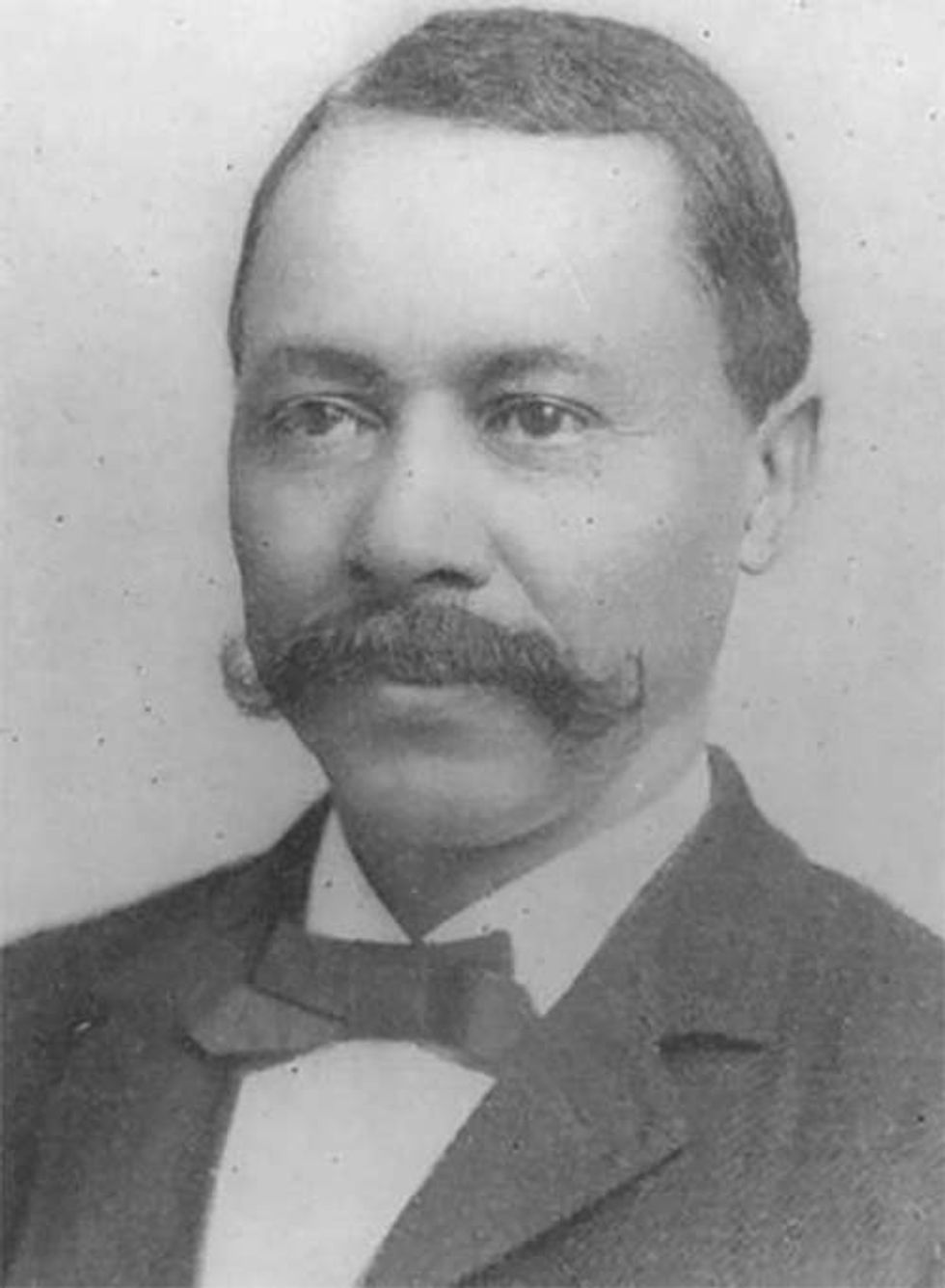
Ebenezer Don Carlos Basset
Fair Use/National Museum of American Diplomacy
Born into a free Black family in Connecticut in 1833, Bassett broke racial barriers from the very onset of his career. He was the first Black student admitted to the Connecticut Normal School and taught at the pioneering Institute for Colored Youth in Philadelphia in the years before the Civil War.
His impassioned polemics for abolition and equal rights during the war thrust him into the political spotlight. President Ulysses S. Grant appointed him minister to Haiti and the Dominican Republic in 1869, Basset became the first African American to serve as a diplomat anywhere in the world. Upon his return to the United States, he served as American Consul General for Haiti in New York City.
Frederick Douglass
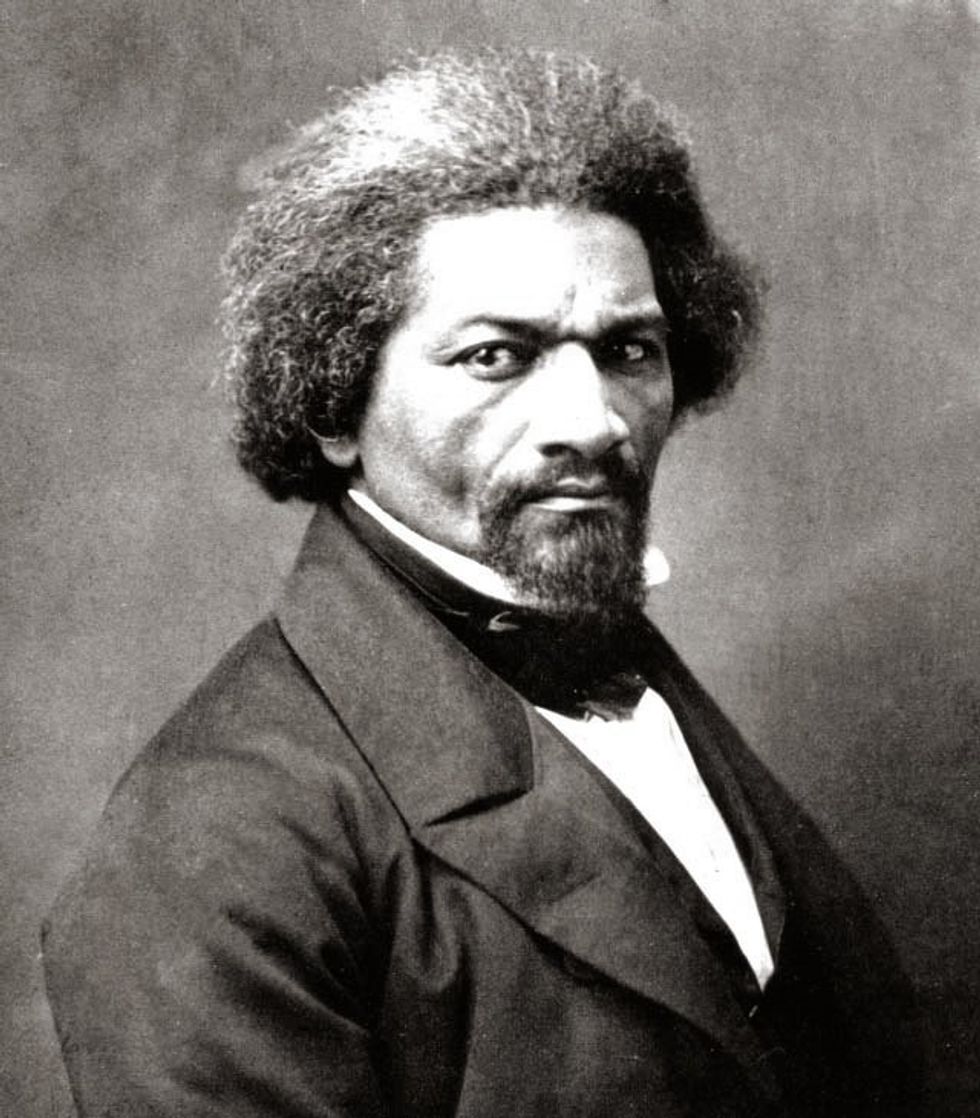
Frederick Douglass
Wiki Commons
Frederick Douglass, renowned abolitionist and orator, served as the United States minister resident, and consul-general to Haiti and Chargé d'affaires for Santo Domingo in 1889, appointed by President Benjamin Harrison. However, Douglass resigned in 1891, opposing President Harrison's aggressive territorial ambitions in Haiti. Haiti nonetheless honored Douglass by appointing him as a co-commissioner of its pavilion at the 1892 World's Columbian Exposition in Chicago. His principled stance against imperialism cost him his diplomatic career and underlines the tension Black diplomats still may feel navigating the predominantly white and upper-class U.S. Foreign Service.
William Henry Hunt
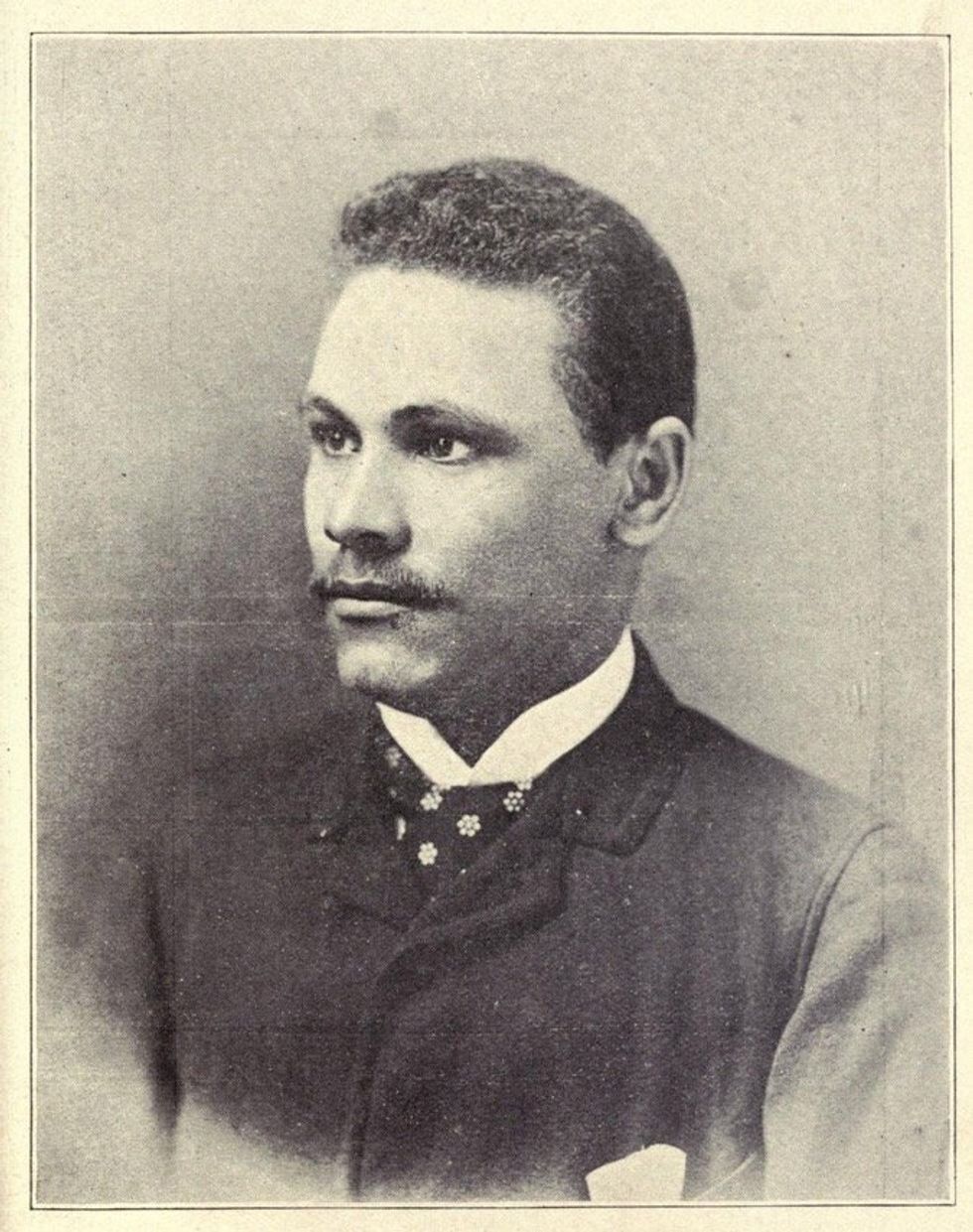
William Henry Hunt
Wiki Commons
Hunt was born into slavery in Tennessee in 1863, the son of Sophia Hunt and the man who enslaved her. Upon emancipation, his mother took him to Nashville, where access to education allowed him to attain a post in the US Consulate in Madagascar eventually. He went on to serve in consular roles spanning from Liberia to France until his retirement on December 31, 1932, pioneering a path for Black diplomats in the 20th century.
James Weldon Johnson
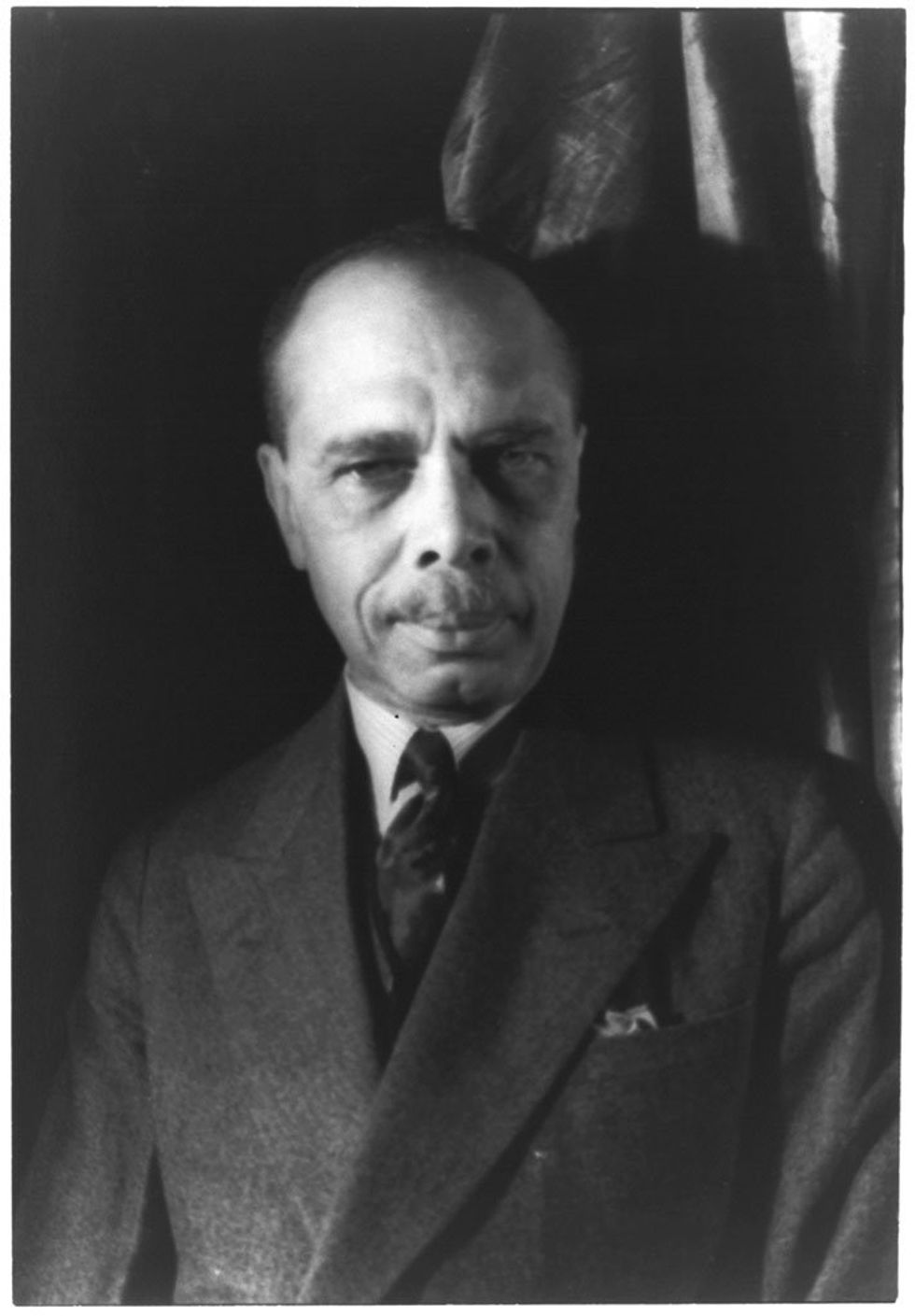
James Weldon Johnson
Library of Congress/Flickr Commons
Johnson served as a consul in Venezuela from 1906-1913, under President Theodore Roosevelt. However, he’s best remembered for contributions to the African-American cause that transcended diplomacy. He was a leading figure in the early days of the National Association for the Advancement of Colored People – effectively its executive officer from 1920 – and wrote “The Autobiography of An Ex-Colored Man.” He also co-wrote "Lift Every Voice and Sing," often referred to as the Black National Anthem, and established the "Daily American," the first Black newspaper.
Ralph Bunche
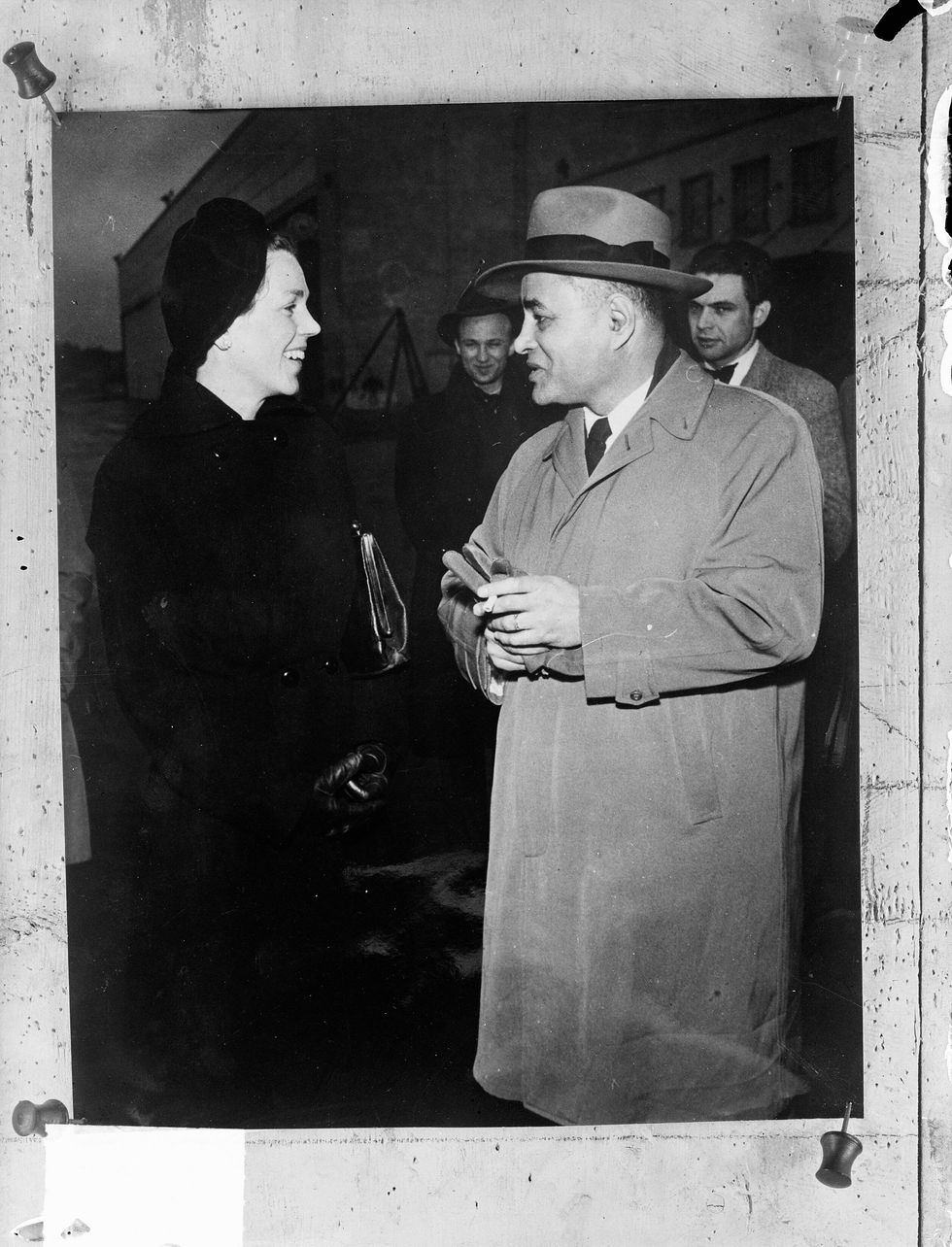
Anefo photo collection. Dr. Ralph Bunche in Stockholm with the widow of Count Folke Bernadotte. April 10, 1949. Stockholm, Sweden.
IMAGO/piemags via Reuters Connect
Ralph Bunche was arguably the most prominent African American diplomat of the twentieth century. He worked at the State Department from 1943 to 1971, serving under every president from Franklin Roosevelt to Richard Nixon. His initial focus on civil rights for African Americans evolved into a global human rights advocacy. He played a pivotal role in the formation of the United Nations in 1945 and the adoption of the UN Declaration of Human Rights in 1948. In 1950, he won the Nobel Peace Prize for his mediation efforts in the Palestine conflict, and in 1963, President Lyndon B. Johnson awarded him a Presidential Medal of Freedom.
Edward Dudley
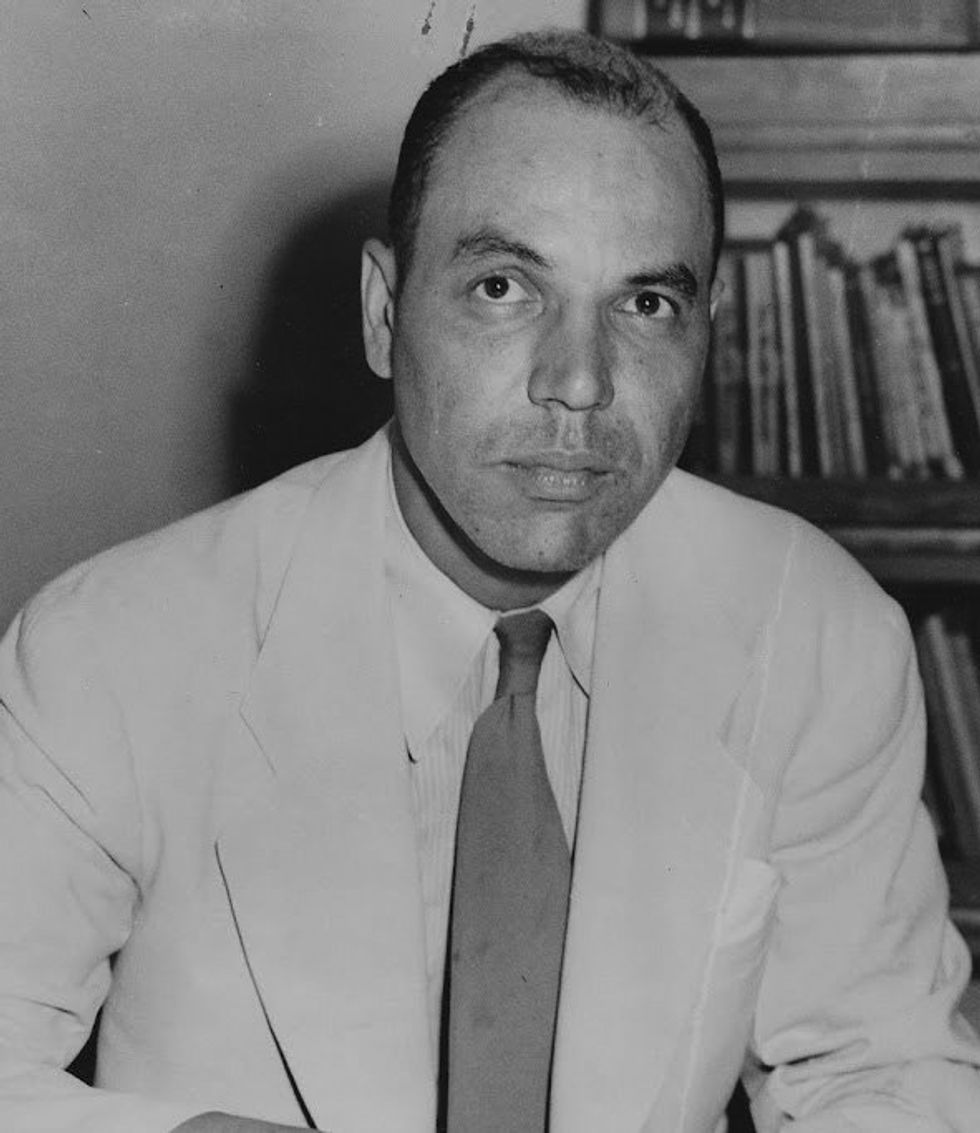
Edward Dudley
Fair Use/Flickr
Dudley was named minister to Liberia in 1948 and then an ambassador when the US raised its diplomatic mission to the embassy level the following year under the administration of Harry Truman. During this period, he and a few other Black diplomats were instrumental in the dismantling of the “Negro Circuit”, which limited the Black diplomatic corps to undesirable posts in select countries—often African and predominantly Black countries—while their white counterparts were transferred all over the world.
Clifton R Wharton Sr
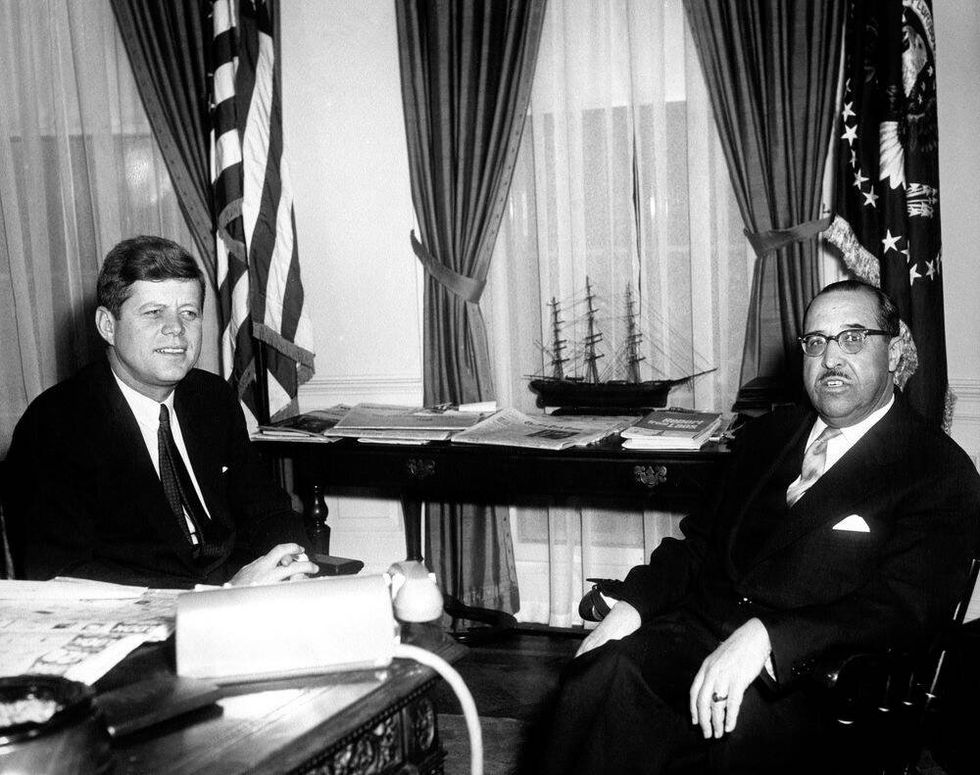
Meeting with the US Ambassador to Norway Clifton R. Wharton, Sr., 3:50 PM. President John F. Kennedy sits with US Ambassador to the Kingdom of Norway, Clifton R. Wharton. Oval Office, White House, Washington, D.C.
IMAGO/piemags via Reuters Connect
Wharton was the first African American to pass the rigorous Foreign Service examination and benefitted from the advocacy against the “Negro Circuit.” He worked across embassies and consulates around the world. He was the first Black career diplomat to lead a US mission in Europe as Minister to Romania, appointed by President Dwight Eisenhower. Wharton was appointed a US representative to NATO—a first for Black Americans—and a UN delegate. USPS issued a stamp as a tribute to his impeccable service 16 years after he passed.
Carl Rowan
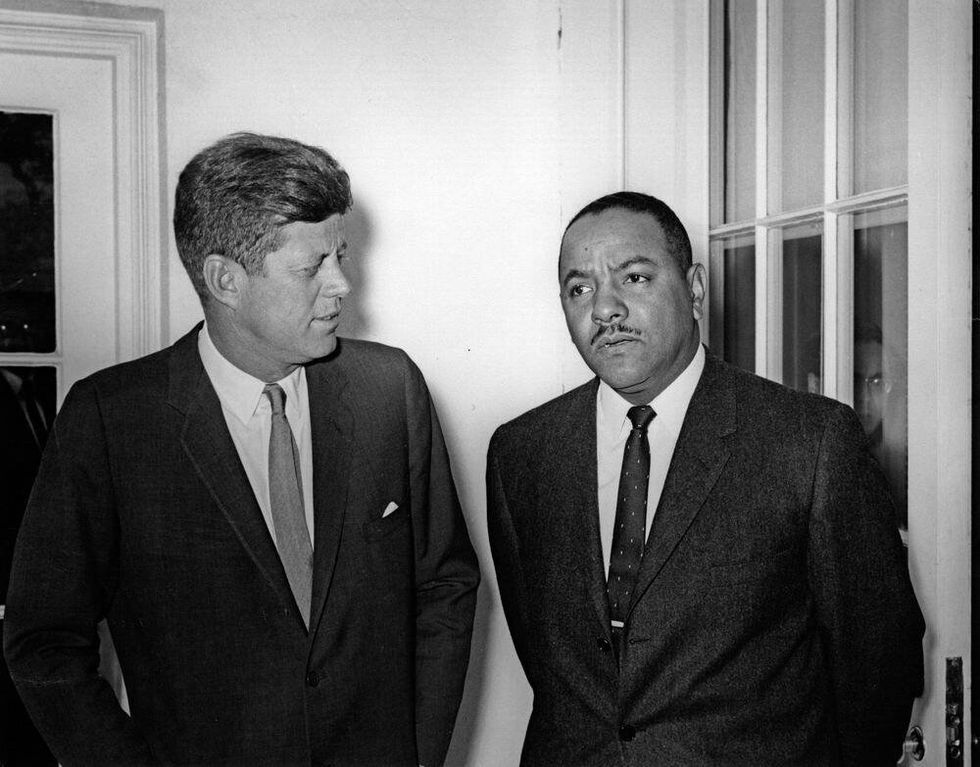
Meeting with the US Ambassador to Finland, Carl T. Rowan, 11:53AM. President John F. Kennedy meets with newly-appointed U.S. Ambassador to Finland, Carl T. Rowan right. West Wing Colonnade, White House, Washington, D.C.
IMAGO/piemags via Reuters Connect
Rowan rose to fame as a reporter for The Minneapolis Tribune, writing an acclaimed series about racism in America. He sat and interviewed the most prominent figures in America, including then-Senator John F. Kennedy, on the campaign trail in 1960. Impressed, Kennedy appointed Rowan Deputy Assistant Secretary of State, where he played a crucial role at the United Nations during the Cuban Missile Crisis. Later, he was the first Black director of the United States Information Agency (USIA) and, at that time, was the highest-ranking African American in the US government.
Patricia Roberts Harris
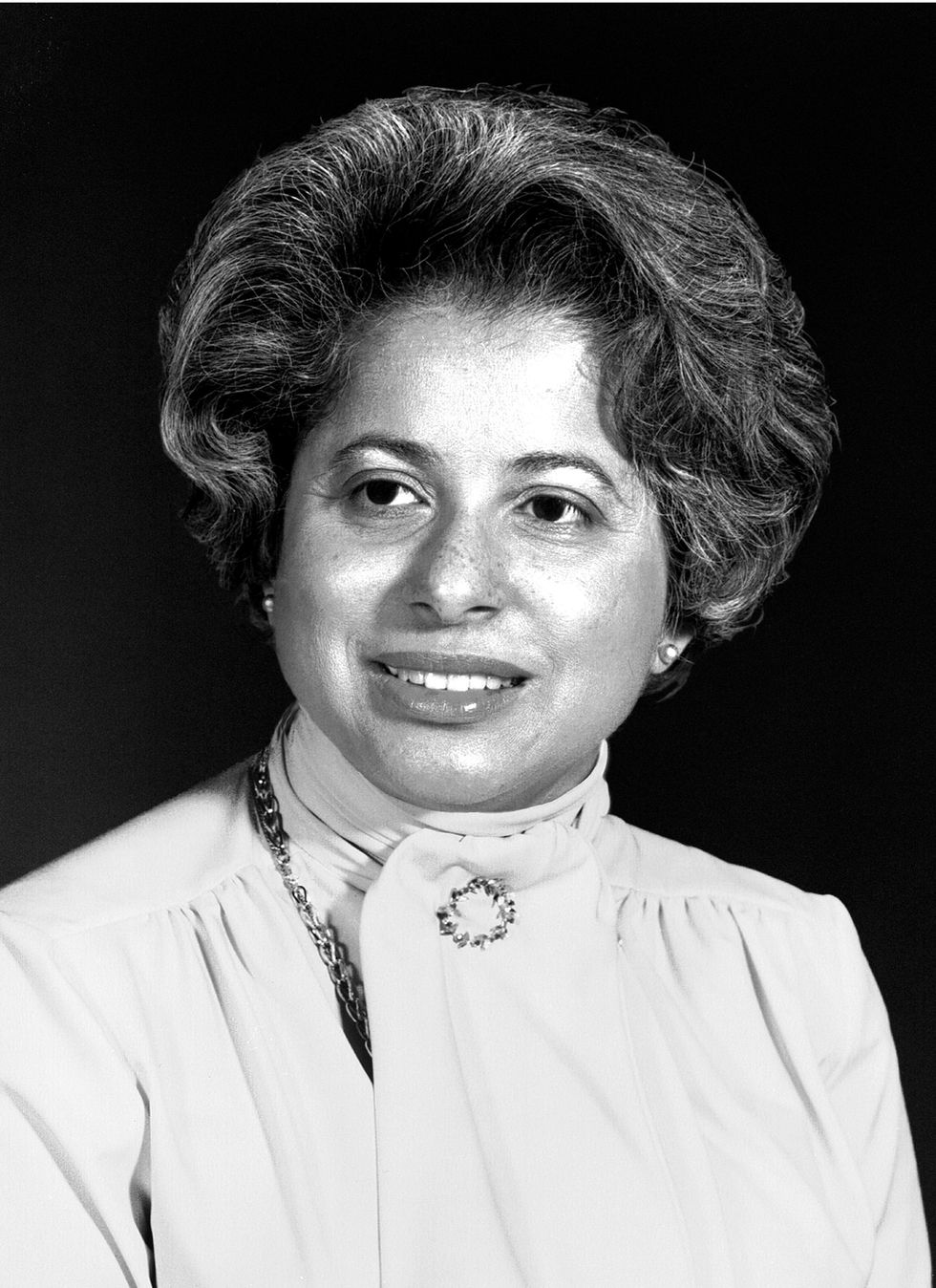
Patricia Roberts Harris
Fair Use/United States Department of Housing and Urban Development
The first African American woman to serve as a US ambassador, Harris served in Luxembourg between 1965-67 under the administration of President Lyndon Johnson. After her tenure, she was nominated as the Secretary of Housing and Urban Development in President Jimmy Carter’s cabinet in 1977. Her confirmation meant she became the first Black woman to direct a federal department.
Mabel M. Smythe-Haith
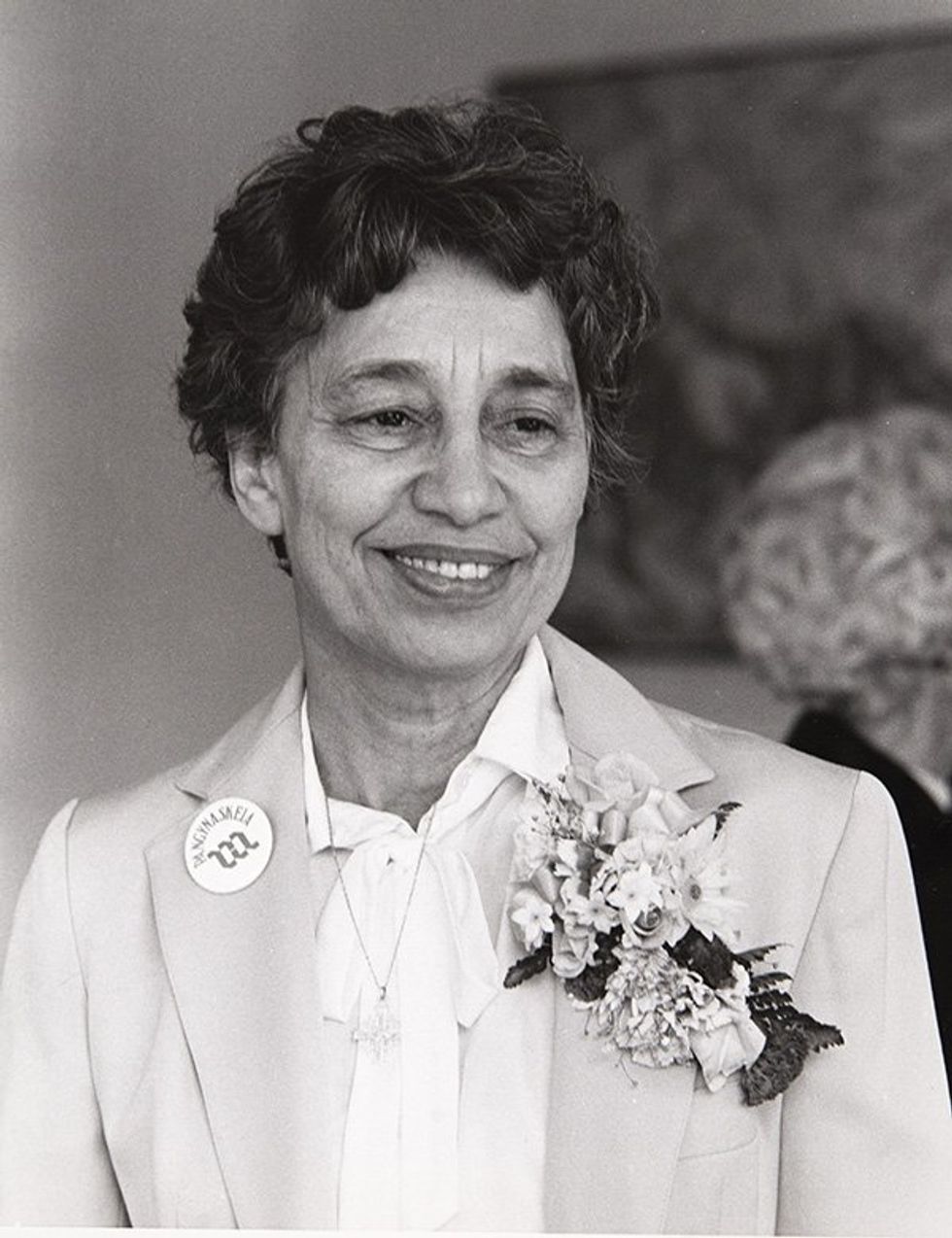
Mabel M. Smythe-Haith
Fair Use/Flickr
Smythe-Haithe was the first Black woman to hold an ambassador position in Africa and the second Black female ambassador during the Carter Administration. Prior to her diplomatic career, she worked with the NAACP on the landmark Brown v. Board of Education desegregation case alongside Thurgood Marshall. She also served on the State Department’s Advisory Council for African Affairs under President John F. Kennedy.
Colin Powell
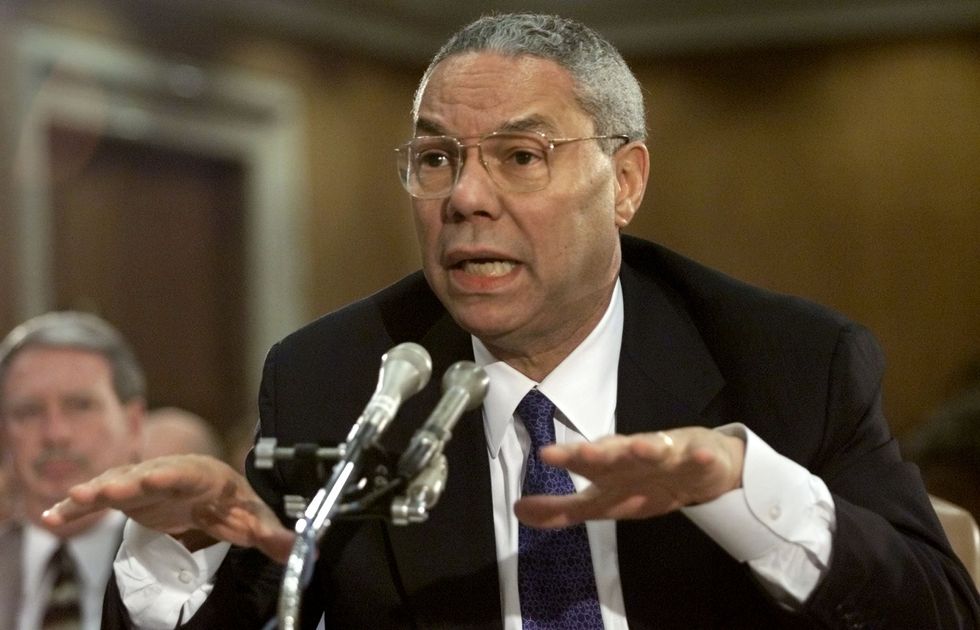
U.S. Secretary of State Colin Powell makes a point as he testifies May 15, 2001, before the Senate approprations subcommittee for programs of the State Department for the fiscal year 2002.
Reuters
Born in New York to immigrant parents from Jamaica, Powell became the first Black Secretary of State under President George Bush in 2001 after a 35-year career in the military. Powell oversaw foreign policy during the worst national disaster of recent memory, the September 11 attacks. Despite accolades, his tenure was marked by controversy, notably his defense of the 2003 Iraq invasion before the United Nations Security Council. He resigned upon President Bush's 2004 reelection, but his tenure coincided with a surge in black diplomats in the Foreign Service.
Condoleezza Rice
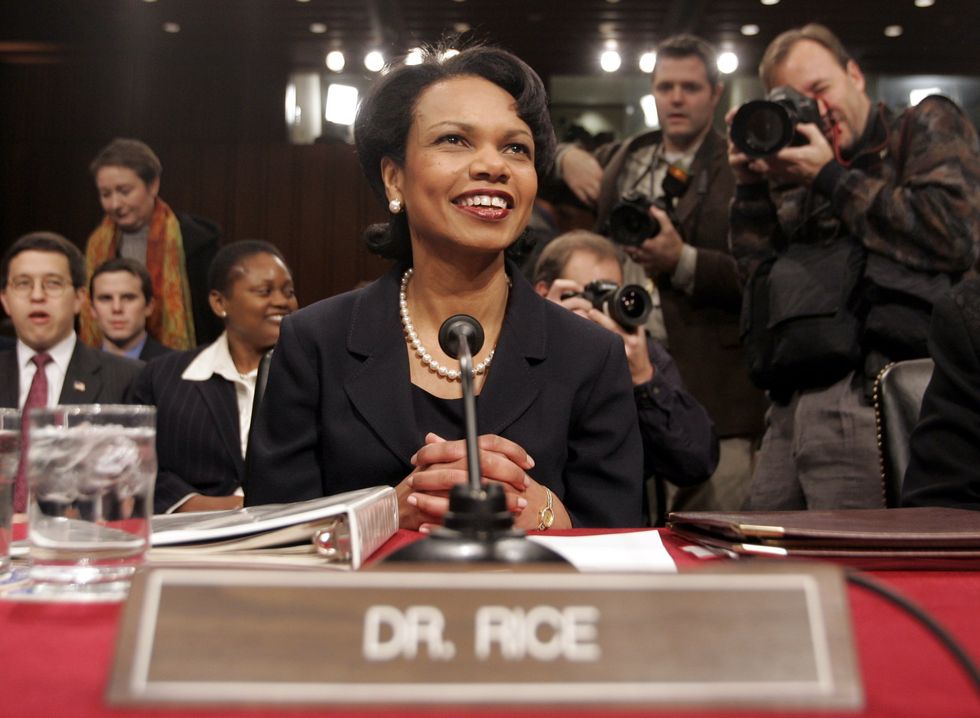
U.S. Secretary of State-designate Condoleezza Rice sits before her U.S. Senate confirmation hearing on Capitol Hill in Washington, January 18, 2005. Rice vowed to press diplomacy in President Bush's second term after he was criticized for hawkish and unilateral policies in his first four years.
Larry Downing/Reuters
Appointed as National Security Advisor by President George W. Bush in 2002, Rice made history as the second Black person and first Black woman to serve as Secretary of State in 2005. In that role, she advocated for Israel’s withdrawal from Gaza and ceasefire negotiations with Hezbollah in 2005 – though the Bush administration’s legacy in Iraq and Afghanistan dominates memories of her tenure. Under her leadership, the State Department witnessed an increase in Black diplomats, although this progress saw setbacks under President Donald Trump.
- The 1619 Project’s creator Nikole Hannah-Jones discusses its cultural impact ›
- The history of Black women judges in America ›
- The Graphic Truth: Black immigrants in the US ›
- The Graphic Truth: Black representation in the US Congress ›
- Why do Black people feel "erased" from American history? ›
- Ron DeSantis and the latest battle over Black history ›
- Will foreign policy decide the 2024 US election? - GZERO Media ›
- Kamala Harris makes her case - GZERO Media ›
At the Munich Security Conference, Trump isn't the only elephant in the room
The Munich Security Conference (MSC) is all about providing a space to address the elephant in the room and fostering discussion on that one big topic people would rather avoid, says Benedikt Franke, the forum’s vice-chairman and CEO. But there’s more than just one elephant this year — a herd.
GZERO’s Tony Maciulis spoke with Franke in the lead-up to the conference about the various “elephants” on the agenda: The war in Gaza, Donald Trump, AI, and the war in Ukraine, to name a few.
They also delve into how the conference has always been defined by turning points for the world, recounting times when the forum collided with major historical moments — or made history itself. The 2024 MSC comes amid a year in which a record number of voters will head to the polls in dozens of critical elections across the globe when many people feel increasingly pessimistic about the future.
Franke says the conference hopes to answer the question of how to inject some optimism back into discourse on the world’s problems. “We don't want this to be a doom and gloom conference, we want to do everything we can to look for the silver lining at the horizon, for the low-hanging fruits, and there are many,” he says.
Join Ian Bremmer and a panel of experts this Saturday, February 17, at 12 pm ET/9 am PT/6 pm CET for our Global Stage discussion at the Munich Security Conference: Protecting Elections in the Age of AI.
Keep up with GZERO's Global Stage coverage of MSC 2024 for more.
U.S. National Security Advisor Jake Sullivan attends a session during the 54th annual meeting of the World Economic Forum in Davos, Switzerland, January 16, 2024.
US and China set up back-channel meetings as pressure over Yemen grows
US National Security Advisor Jake Sullivan will reportedly meet with Chinese Foreign Minister Wang Yi behind closed doors in the coming days to discuss the Middle East and Taiwan.
Several top-level meetings had already been on the public schedule, but this private format – previously used to set the stage for the 2023 Biden-Xi summit as well as to smooth things over after House Speaker Nancy Pelosi’s 2022 visit to Taiwan – allows a more candid exchange on sensitive issues.
Taiwan on the agenda. The meeting comes just one month after pro-independence candidate William Lai won the Taiwanese presidential elections. As such, it’s a chance for Washington and Beijing – which considers Taiwan to be part of China – to speak frankly about boundaries over the self-governing island, minimizing risks to the stability of the US-China relationship.
But the Houthi issue may be more pressing, as the Iran-backed rebel group’s attacks on Red Sea are posing a broader risk to the global economy. Some 15% of global trade normally passes through the Red Sea, including crucial cargoes of oil, natural gas, and grains. Ships forced to take the 4,000-mile longer alternate route around the Cape of Good Hope add about 10 days time and triple the cost of shipping, raising prices for the producers and consumers who rely on those goods.
The US, which has pounded Houthi positions with airstrikes, has also been asking Beijing to use its good offices with Iran to ask Tehran to restrain the Houthis. Beijing’s reaction has essentially amounted to “sinking ships is bad, but you’re on your own, pal.” In part that may be because the Houthis have promised not to attack Chinese ships, a pledge that some Chinese shipping companies are capitalizing on. Still, if the Red Sea choke-out starts to have wider effects on the global economy, China – still nursing a slow post-pandemic recovery – may start to see things differently.How will Henry Kissinger be remembered in Europe?
Carl Bildt, former prime minister of Sweden, shares his perspective on European politics from Stockholm.
How will Henry Kissinger be remembered in Europe?
There's always an amount of controversy around the person who's been around in politics in powerful positions for such a long time as he was. But primarily, I think he would be remembered as a great European. He was an American, no doubt. But he came out of the tragedy of Europe and he was deep concerned with all of the lessons that could be learned from the failure to preserve peace in Europe time after time. His first academic and his first book was about the Congress of Vienna. And then book after book after book, that was really around the same theme, how to preserve peace also in the age of nuclear weapons. And that, of course, from the European point of view, is not an insubstantial issue.
Is the nuclear renaissance going on in Europe?
Sort of. I would say. There are still countries that are very much opposed. The Germans are, the Austrians are, there might be others. But I noticed that in Dubai, COP28, there was now signed declaration by a number of European leaders as well to triple global nuclear power by 2050. So no doubt nuclear power will make a substantial contribution to the efforts to create a much greener and much more sustainable Europe in the decades to come.

